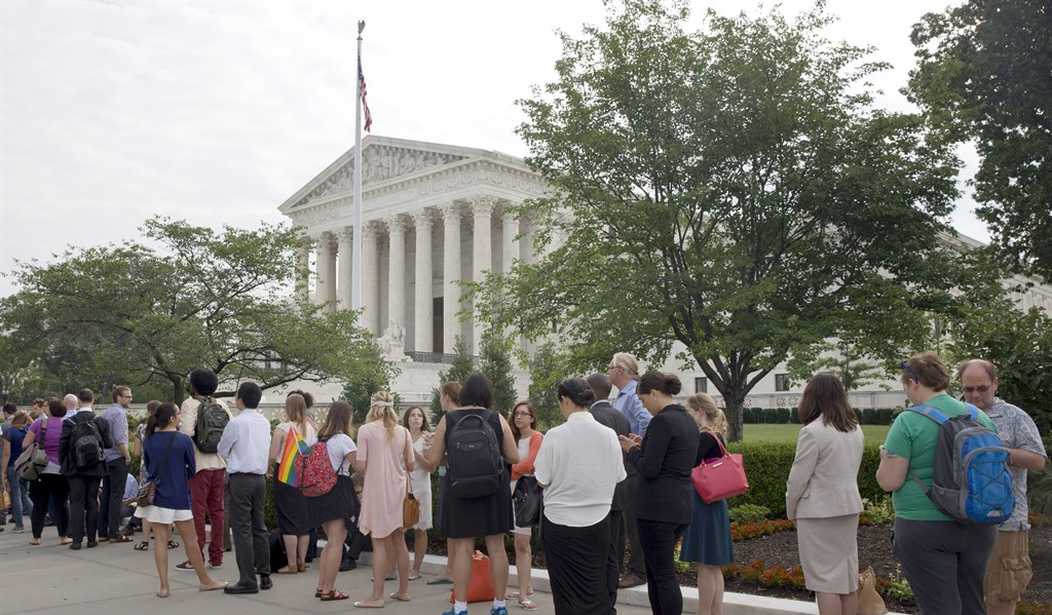The GOP-majority Supreme Court saved President Barack Obama's bacon Thursday with a political ruling that papered over his signature Affordable Care Act. Writing for the majority in the 6-3 King v. Burwell decision, Chief Justice John Roberts noted that the 900-page law was written behind closed doors with little debate or amendment and thus was "inartfully" drafted. It was the court's obligation, he wrote, to translate bill language limiting the government subsidies to enrollees in "an exchange established by the State" as meaning enrollees in federal exchanges also can get subsidies.
Roberts always has been a consummate politician in his role as guardian of the big bench. The President George W. Bush appointee had good reason to fear how the public might react if the Supreme Court overturned a law that benefits millions of Americans.
Thirty-four states rely on federal Obamacare exchanges. That's 6 million people, 87 percent of whom bought health care with federal tax credits. Roberts cited a study that predicted that cutting off those subsidies would result in a 47 percent increase in premiums and a 70 percent decline in enrollment.
Between a rock and a hard place, Roberts argued that Congress surely never meant to cut out subsidies in states without their own exchanges, because "it would destabilize the individual insurance market in any State with a Federal Exchange, and likely create the very 'death spirals' that Congress designed the Act to avoid."
I sympathize, but Roberts has to know he's wrong. Jonathan Gruber, an MIT economist who advised the White House, explained during a 2012 speech that the federal law limited subsidies to enrollees of state exchanges in order to "squeeze" states to act. Quoth Gruber, "If you're a state and you don't set up an exchange, that means your citizens don't get their tax credits, but your citizens still pay the taxes that support this bill."
Recommended
George Washington University law professor Jonathan Turley -- no conservative he -- wrote last year, "I believe that the text is clear in the Act and that the Obama Administration effectively altered the language when 34 states decided to defy the government and refuse to create state exchanges."
Joined by two conservative brethren, Justice Antonin Scalia wrote a blistering dissent. He raged that words have no meaning if "established by the State" doesn't mean just that -- and the law used the term repeatedly. Observing that Roberts also penned the 2012 decision that, by a 5-4 majority, perversely interpreted the Affordable Care Act "penalty" language as actually representing a tax, Scalia railed, "We should start calling this law SCOTUScare."
I think Roberts did what he did to protect the court from the outrage that would have followed if millions of Americans had lost their subsidies. There's a big hole in my thinking, as Carrie Severino, chief counsel and policy director of the conservative Judicial Crisis Network, kindly pointed out over the phone. Even without Roberts, there were five justices -- GOP appointee Anthony Kennedy joined the four Democratic appointees -- ready to uphold the health care act as per the Obama administration.
Severino, too, first assumed Roberts was attempting to "jump on the grenade of a bad decision" by penning a less damaging decision than Kennedy and company would have written, she wrote for National Review's Bench Memos blog. After reading the decision, however, she decided the chief justice "has simply gone over to the dark side."
The Obama administration never has had much respect for process -- an attitude that rubbed off on the Democratic Congress that passed the Affordable Care Act in 2010. The president dishonestly claimed, "If you like your health care plan, you can keep your health care plan." Then-House Speaker Nancy Pelosi infamously said, "We have to pass the bill so that you can find out what is in it, away from the fog of the controversy."
The fog of the controversy only has gotten murkier.
The result is the mess that put Roberts in the position of believing he had to engage in judicial activism in order to not look like a judicial activist.
As a conservative, I think it serves the country best if elected officials, not judges, repair what's wrong in Obamacare. Former Texas Gov. Rick Perry, a 2016 GOP presidential hopeful, hit the right note when he said he did not agree with the ruling. "It was never up to the Supreme Court to save us from Obamacare," he said in a statement issued Thursday.
Because the Democratic Congress wrote a heavy-handed provision that the Obama White House determined it was best to ignore, the Supreme Court got handed a live grenade. With all the Democratic justices on board, Roberts jumped on the grenade -- leading with a bogus argument.
The real casualty is any notion that the U.S. Supreme Court remains an honest broker.
























Join the conversation as a VIP Member